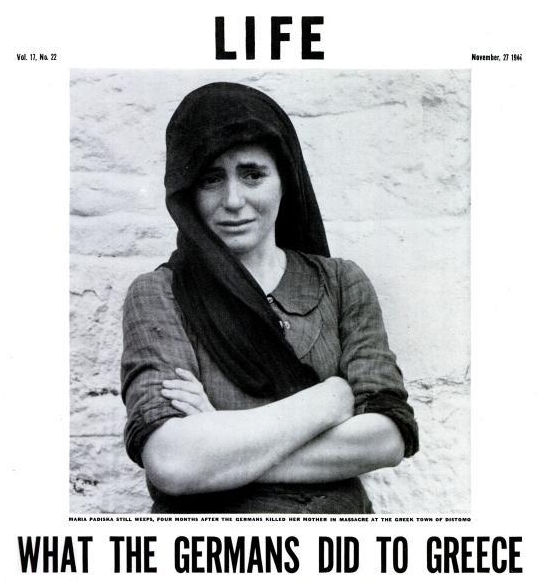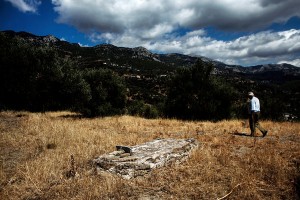The Math of Mass Starvation and Murder
The Math of Mass Starvation and Murder: Germany in Greece During World War II
By Evaggelos Vallianatos
The German occupation of Europe in the 1940s was brutal. Millions of people died. Europe was devastated. However, no European country suffered as much as Greece.
The Greeks were the first Europeans who won a victory against fascism. They defeated the Italian allies of the Germans. They fought bravely against the attacking Germans and kept fighting them throughout the occupation of their country, 1941-1944.
Once in Greece, the Germans rewarded Greek bravery with implacable hostility. They dismembered the country, dividing it between the Bulgarians, the avenging Italians, and themselves.
The unspoken strategy of the occupiers (Germans, Italians, Bulgarians) was to wipe out the Greeks through starvation, bombing, and mass murder. They did that, inflicting unspeakable atrocities against the civilian population. But the Germans, being the warlords-in-chief, outdistanced their partners in crime, Bulgarians and Italians. Their barbarism easily surpassed that of all previous foreign occupiers of Greece.
In the short period of German occupation, 1941-1944, the violence of the German-led armies of conquest, turned Greece from a modestly well-to-do country to a country on the brink of death.
The following math of mass starvation and murder tell the story. The numbers come from “The Sacrifices of Greece in the Second World War,” a 1946 report prepared for the Greek government by the architect K. A. Doxiadis. In 2014, the Athenian daily, Kathimerini, reprinted this valuable and lavishly illustrated two-volume study in commemoration of the sacrifices Greeks made during WWII.
The story of WWII Greece starts with food, the weapon of starvation for the occupiers. During 1941-1944, there was a dramatic decline in Greek food production: wheat and barley, life and death crops for the Greeks, dropped by 40 percent; beans, 36 percent; tobacco, 89 percent; cotton, 75 percent; olive oil, 16 percent; grapes and raisins, 66 percent; wine, 50 percent; fruits, 20 percent.
The occupiers speeded Greek starvation by killing the peasants’ farm animals. They slaughtered 60 percent of the horses, mules, and cattle; 50 percent of the donkeys, sheep and goats; 80 percent of the hogs; and 50 percent of the chickens.
Next after food, the entire country became a field of desolation for the Germans, Italians and Bulgarians. They destroyed 25 percent of the country’s forests; 56 percent of the roads; 50 to 90 percent of the bridges; 65 percent of automobiles; 60 percent of the trucks; 80 percent of the buses; 100 percent of the trains and railways; 80 percent of the factories; 100 percent of the water and sewage infrastructure.
The 1946 report says: “principal harbors were blown up… Installations, machinery and quays were destroyed.” The Germans also blew up the strategic Corinth canal. In addition, the Germans sank 74 percent of the Greek ships and destroyed 100 percent of telephone communications.
The Germans bombed all major Greek cities, inflicting heavy damage. According to the 1946 study: “The whole country lies in ruins. From northern Epirus to the Dodecanese large and small buildings, churches, schools, hospitals and dwellings have been transformed into a mass of tragic ruins.”
The countryside had a similar fate. According to the 1946 study, “the occupying forces applied a systematic plan for the destruction of Hellenism: the burning of villages. 1,770 Greek villages lie in ashes. In certain parts of the country, particularly near the frontiers, destruction by fire reached the proportion of 90 % of the villages of every region.”
The Germans and their allies killed or were responsible for the death of thirteen percent of the Greek population. In 1940, there were 7,335,000 people in Greece. In 1944, the population numbered 6,805,000 persons. The report notes that the favorable methods of mass murder included: “Hangings, massacres, shootings, [and] death vans.”
The genocidal effects of German occupation of Greece reached a macabre climax in June 1944. On June 10, 1944, Greek partisans killed a few German soldiers near Distomo, a small village near Parnassus and Delphi. The Germans retaliated with crusading ferocity.
Hundreds of soldiers advanced toward Distomo – spreading death on their way, shooting people and animals. Once in the village, the Germans acted with a mania for death and criminality rarely matched in history. They kept shooting anyone on sight. But eventually, they put the annihilation of Distomo into action. They raped all female children and women, cutting their breasts and ripping apart their stomachs. In some cases, they strangled the women with their own guts. They cut the throats of all infants.
The Germans then shot or hanged all boys and men. In fact, they used bayonets to crucify men on trees lining the streets. All this mayhem took the Germans an entire day. The next day, they came back to Distomo and filled their trucks with looted goods from the homes of the dead peasants.
A Swedish Red Cross worker stationed in Athens, Sture Linner, witnessed the results of the German atrocity. In his book, My Odyssey, he admits he drove a truck full of food to Distomo. It was June 14, 1944. He entered a village in flames, empty of life, utterly destroyed. The picture could have matched Dante’s inferno.
Linner visited Distomo in November 1944 when the Germans were withdrawing from Greece. Greek partisans surrounded a detachment of German soldiers near Distomo. Linner drove a truck full of food. A priest and a Greek military commander met him near the village. The priest said both Greeks and Germans were starving. But he urged Linner to feed the defeated Germans because they had a long way to reach home.
Linner’s Greek wife burst into tears.
This article is a Truthout original.
Evaggelos Vallianatos is the author of several books, including “Poison Spring,” forthcoming from Bloomsbury Press.
Source: trouthout

